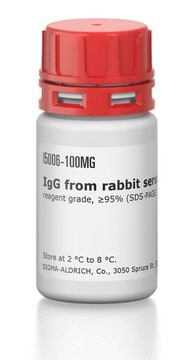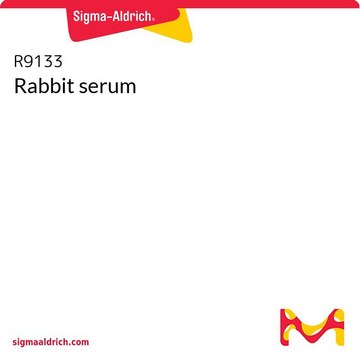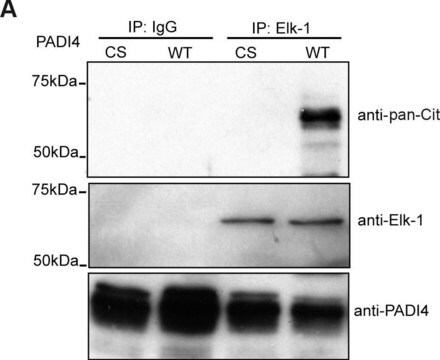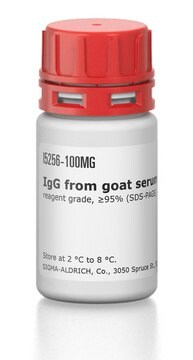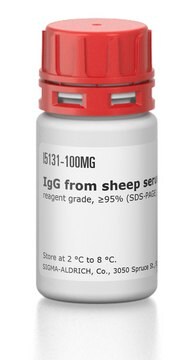Wszystkie zdjęcia(1)
Key Documents
I8140
IgG from rabbit serum
technical grade, ≥80% (SDS-PAGE), buffered aqueous solution
Synonim(y):
Rabbit IgG
Zaloguj sięWyświetlanie cen organizacyjnych i kontraktowych
About This Item
Polecane produkty
białko sprzężone
unconjugated
Poziom jakości
klasa czystości
technical grade
Próba
≥80% (SDS-PAGE)
Postać
buffered aqueous solution
Warunki transportu
dry ice
temp. przechowywania
−20°C
Szukasz podobnych produktów? Odwiedź Przewodnik dotyczący porównywania produktów
Zastosowanie
IgG from rabbit serum has been used:
- as a reference, standard or blocking agent in many immunoassays including dot blots, ELISA, Westerns, IEP, and immunodiffusion assays
- in arthus reaction
- in chromatin immunoprecipitation
Działania biochem./fizjol.
Immunoglobulin G (IgG) regulates the immune responses such as phagocytosis and is also involved in the development of autoimmune diseases. IgG1 regulates complement fixation in mice.
Postać fizyczna
Solution in 0.01 M phosphate buffered saline, pH 7.2, containing 15 mM sodium azide
Uwaga dotycząca przygotowania
Rabbit IgG is purified via fractionation from pooled normal rabbit serum
Komentarz do analizy
Immunoelectrophoresis (IEP) is used to establish the identity of the Rabbit IgG. . A single major arc of precipitation in the gamma region is observed versus anti-rabbit whole serum and anti-rabbit IgG. Minor gamma arcs may be present versus anti-rabbit whole serum
Oświadczenie o zrzeczeniu się odpowiedzialności
Unless otherwise stated in our catalog or other company documentation accompanying the product(s), our products are intended for research use only and are not to be used for any other purpose, which includes but is not limited to, unauthorized commercial uses, in vitro diagnostic uses, ex vivo or in vivo therapeutic uses or any type of consumption or application to humans or animals.
This page may contain text that has been machine translated.
Kod klasy składowania
12 - Non Combustible Liquids
Klasa zagrożenia wodnego (WGK)
WGK 2
Temperatura zapłonu (°F)
Not applicable
Temperatura zapłonu (°C)
Not applicable
Certyfikaty analizy (CoA)
Poszukaj Certyfikaty analizy (CoA), wpisując numer partii/serii produktów. Numery serii i partii można znaleźć na etykiecie produktu po słowach „seria” lub „partia”.
Masz już ten produkt?
Dokumenty związane z niedawno zakupionymi produktami zostały zamieszczone w Bibliotece dokumentów.
Klienci oglądali również te produkty
Valérie Bardet et al.
Haematologica, 91(6), 757-764 (2006-06-14)
Abnormal activation of several signal transduction pathways such as phosphoinositide 3-kinase (PI3K) and MAP kinases has been reported in acute myeloid leukemia (AML). To test new targeted therapeutics, it is critical to develop sensitive analytical tools to detect abnormal activation
Frances Rena Bahjat et al.
Arthritis and rheumatism, 58(5), 1433-1444 (2008-04-29)
To assess whether R788, an orally bioavailable small molecule inhibitor of spleen tyrosine kinase (Syk)-dependent signaling, could modulate disease in lupus-prone (NZB x NZW)F1 (NZB/NZW) mice via inhibition of Fc receptor (FcR) and B cell receptor signaling. R788 was administered
Janus Schou Jakobsen et al.
Genome research, 23(4), 592-603 (2013-02-14)
Dynamic shifts in transcription factor binding are central to the regulation of biological processes by allowing rapid changes in gene transcription. However, very few genome-wide studies have examined how transcription factor occupancy is coordinated temporally in vivo in higher animals.
Elena Matveeva et al.
Cell discovery, 2, 15046-15046 (2016-07-28)
Specialized chromatin structures such as nucleosomes with specific histone modifications decorate exons in eukaryotic genomes, suggesting a functional connection between chromatin organization and the regulation of pre-mRNA splicing. Through profiling the functional location of Poly (ADP) ribose polymerase, we observed
Lily Chien Wang et al.
DNA repair, 7(12), 1973-1981 (2008-09-13)
Fanconi anemia (FA) is a recessive genetic disorder characterized by hypersensitivity to crosslinking agents that has been attributed to defects in DNA repair and/or replication. FANCD2 and the FA core complex bind to chromatin during DNA replication; however, the role
Nasz zespół naukowców ma doświadczenie we wszystkich obszarach badań, w tym w naukach przyrodniczych, materiałoznawstwie, syntezie chemicznej, chromatografii, analityce i wielu innych dziedzinach.
Skontaktuj się z zespołem ds. pomocy technicznej